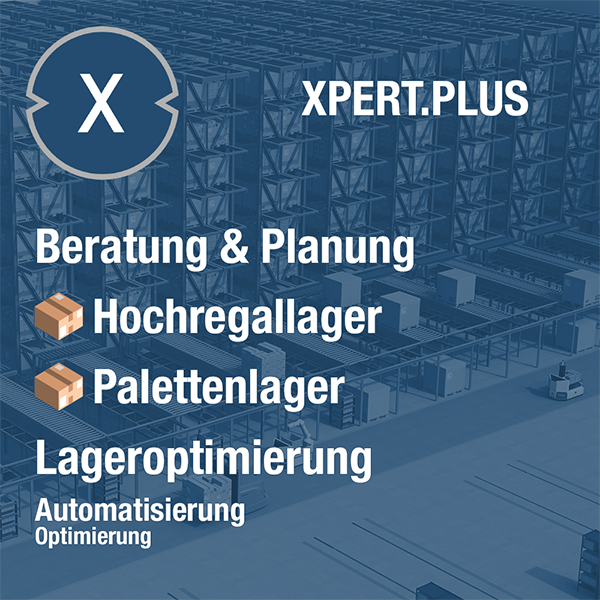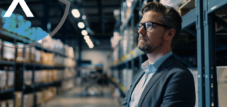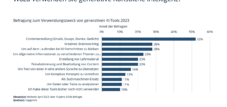Treatise | State of the German economy: Why keep it simple when it can be complicated?
Language selection 📢
Published on: October 10, 2024 / Update from: October 10, 2024 - Author: Konrad Wolfenstein

Tract: Why simple when it can be complicated - The current situation in the German economy - Image: Xpert.Digital
🛑📉 No prospect of growth: When focus on the negative dominates
📉💡 Missed opportunities: The danger of the negative economic mentality
When the dominant attitude in an economy is to first point out what doesn't work or what works, it's a clear sign that there's little growth or sustainability to be expected in that environment. A culture of rejection and stagnation emerges that stifles innovation and entrepreneurship. In many companies and service sectors you can observe how rigid regulations, bureaucracy and the constant highlighting of restrictions lead to a blocking attitude. Instead of looking for solutions and seizing opportunities, the focus is often drawn to what is not possible.
🏢 The blockade attitude of the bureaucracy
An example that illustrates this attitude is how we deal with bureaucratic hurdles in many industries. Companies and individuals are often faced with a barrage of regulations that provide more obstacles than help. Although regulations are necessary to ensure standards and prevent abuse, as soon as these regulations become so prominent that they stifle room for maneuver, the entire economy suffers.
Sustainability and growth are based on the ability to adapt flexibly to new circumstances, and this requires openness to innovation and creativity. However, if an economy is focused on primarily identifying problems and risks rather than recognizing opportunities, sustainable solutions will not emerge. Companies need space to take risks, make mistakes and learn from them. But when every decision is slowed down by endless bureaucratic processes, important opportunities are lost.
🌟📖✨ My current personally experienced examples
🚛 The example of the carrier
An example from my everyday business life illustrates this problem: A freight forwarder explains to me that a pallet that is bulky due to the given circumstances cannot be transported because the pallet truck supposedly cannot carry the weight or does not fit under the Euro pallet. However, when I showed myself that it was very possible to carry out the transport, the initial blocking attitude became obvious. This is not a technical or logistical problem, but rather a mindset designed to find problems rather than seek solutions. Such situations often arise when companies focus on minimizing risks and responsibilities rather than on providing value to the customer.
This behavior can also be transferred to other areas: If service providers prefer to seek rejections and excuses instead of actively seeking solutions, this leads to a loss of trust and, in the long term, to a negative impact on business relationships. However, in an economy aiming for growth and sustainability, the focus should be on overcoming obstacles and finding new ways to solve problems.
Unclear communication and lack of responsibility 🔄
Another example illustrates the problem of a lack of responsibility and clear communication: A company that advertises “refrigeration – air conditioning – electrical engineering – heat pumps” creates an offer for the installation of an air conditioning system. However, after assembly it is explained that the connection cannot be made because the company does not have the necessary qualifications (in this case a master electrician). This shows a discrepancy between what the company promises to the outside world and what it can actually achieve. Customers trust that a service provider who offers a specific service will provide it in full. If this is not adhered to, frustration arises and trust in the company dwindles.
Unclear or misleading self-presentation, as in this case, is not only annoying for the customer, but also damages the company itself in the long term. The word of mouth that arises after such negative experiences often has a deterrent effect on potential new customers. However, a company that honestly communicates what it can achieve and what its limits are creates trust and strengthens its market position in the long term.
Lack of commitment and delays ⏳
A third example illustrates a “comfortable” delay by a craftsman who does not want to remedy a lack of the house wall caused by him. Although the scaffolding on the house wall is still available, which is to be broken down, the craftsman prefers to go into lunch break instead of correcting the defect immediately. However, it previously emphasizes that he would not be able to remedy the deficiency through a ladder for security reasons - only through the scaffolding. The graft company had to wait as the dismantling. Such a behavior not only shows a lack of willingness to take on responsibility, but also a lack of meaning for urgency and customer orientation.
In many cases, it is not technical or organizational incompetence that hinders progress, but rather a mentality of “comfortable waiting” and “complacent inaction.” Such behavior delays projects and leads to unnecessary costs and lost time. However, sustainable business and growth require that companies and their employees act proactively, face challenges and take responsibility.
🌟 The importance of solution-oriented thinking
These examples illustrate how important it is to promote a positive and solution-oriented work culture. Companies that strive for long-term success must move away from a mindset that is primarily focused on avoiding risk. Instead, they should focus on how to overcome obstacles and seize new opportunities. Such an attitude begins with leadership and must be anchored at all levels of the company. Managers play a critical role in creating an environment that promotes innovation and encourages employees to take ownership.
Clearly defined responsibilities and expectations are also essential. When employees know exactly what is expected of them and what authority they have, they can be more proactive and make decisions faster. This not only reduces delays, but also increases customer satisfaction and strengthens the long-term relationship between customer and company.
💡 The connection between innovation, flexibility and sustainability
Companies that work sustainably and innovatively recognize the need to react flexibly to changes at an early stage. Be it through technological innovations, changing customer needs or legal requirements - the ability to adapt and change is the key to long-term success. Rigid structures based on the insistence of “what can’t be done” cannot achieve this.
Instead, companies should increasingly rely on agile management that leaves room for experiments and creative thinking. This doesn't mean that every idea has to be successful, but the willingness to try new things and take risks is the basis for progress. Such companies are able to constantly develop and operate successfully even in uncertain times.
🔄 A change in mindset is necessary
If companies and entire sectors of the economy continue to focus on what cannot be done, it will be difficult to promote sustainable growth and innovation. A change in mindset is necessary: instead of building up blockages, solutions should be sought and opportunities should be seized. This not only requires courage, but also consistent promotion of a positive and proactive corporate culture. This is the only way companies can grow successfully and sustainably in the long term.
In a world that is constantly changing, we must learn to remain flexible and open to new ideas. Instead of focusing on the obstacles, we should focus on what is possible - because this is the only way we can achieve long-term success.
📣 Similar topics
- 📣 New paths for Germany's economy
- 🚀 Innovation instead of stagnation: change is necessary
- 📉 From blockages to opportunities: rethinking bureaucracy
- 🛠️ Technical skills vs. overcoming mental hurdles
- 🌱 Sustainability requires flexible thinking
- 🔍 Risk vs. Opportunity: A culture of enterprise
- 🏢 Expose bureaucracy as an obstacle to innovation
- 🤝 Trust creates growth: Honest communication
- ⚙️ Being proactive: Key to productivity and success
- 🌐 Economic change through agility and creativity
#️⃣ Hashtags: #bureaucracy, #innovation, #sustainability, #growth, #mindsetchange

Xpert.Plus warehouse optimization - high-bay warehouses such as pallet warehouses consulting and planning
🚀🌱 The importance of a positive economic culture for sustainability and growth
🚫➡️✨ From Obstacles to Solutions: The Path to Economic Renewal
In an economy characterized by globalization and rapid change, it is essential to foster a corporate culture that prioritizes innovation, creativity and problem-solving skills. An economy that focuses primarily on emphasizing obstacles and impossibilities risks stagnation and cannot enable sustainable growth or innovation in the long term. A paradigm shift to a proactive, solution-oriented way of thinking is therefore essential.
⚠️ Challenges of a restrictive economic culture
An economic culture that is heavily characterized by regulation, bureaucracy and a focus on restrictions can have serious negative effects. These can be seen in different areas:
Inhibition of innovation
Companies and employees that are constantly confronted with regulations and restrictions often experience dampened creativity and willingness to innovate. New ideas can be nipped in the bud because the path to realizing them seems too complex or risky.
Loss of competitiveness
In a globalized economy, where agility and adaptability are key competitive advantages, a rigid corporate culture can cause companies to fall behind their more flexible competitors.
Demotivation of employees
An atmosphere that constantly emphasizes what is not possible can have a significant impact on employee motivation and engagement. This leads to a decrease in productivity and a higher turnover rate of qualified specialists.
Missed opportunities
An overly cautious attitude towards new opportunities can result in important business opportunities remaining unexploited, which in the long term harms the growth and development of an organization.
🌿 The path to a sustainable and growth-oriented economy
In order to realize a sustainable and growth-oriented economy, a fundamental rethinking is required at various levels:
Promote a culture of opportunity
Companies should cultivate a culture that focuses on opportunities and solutions rather than problems. This requires that employees be encouraged to think creatively and develop new, possibly unconventional, approaches.
Investment in further training and skills development
Employees need the right skills and knowledge to develop and implement innovative solutions. Therefore, continuing education should be a high priority.
Creation of flexible structures
Companies must rethink their organizational structures and make them more adaptable in order to be able to react more quickly to changing market conditions and promote interdisciplinary collaboration.
Promoting intrapreneurship
Employees should be encouraged to develop entrepreneurial thinking. This can be achieved through initiatives such as internal innovation competitions and providing resources for pilot projects.
Implementation of agile methods
The introduction of agile working methods can enable companies to react more efficiently to changes and promote innovation.
📈 Practical examples and solutions
Example 1: The freight forwarder and the bulky pallet
A carrier who was unable to transport a large pallet demonstrated a lack of flexibility and problem-solving skills. To improve this, employees should be trained in creative problem solving and customer focus. In addition, a reward system for innovative solutions could be introduced and the exchange of successful problem solutions within the team could be promoted.
For example 2: The company for refrigeration, air conditioning, electrical engineering and heat pumps
A company that advertises services that it cannot fully provide will suffer from communication problems and misleading marketing. Clear communication of actual competencies as well as partnerships with qualified experts could help here. Investments should also be made in employee training so that all advertised services can actually be provided.
Example 3: The craftsman and the correction to the house wall
A repairman who was unreliable when making repairs demonstrated a lack of responsibility and customer focus. Improvements could be achieved by implementing comprehensive quality management, customer service training, and incentives for service excellence.
👥 The role of leadership in transformation
Leaders play a critical role in the transition to a positive, solution-oriented business culture. They must act as role models and convey a vision that inspires and motivates employees:
Communication of company values
The corporate values, especially the emphasis on innovation and solution orientation, must be clearly communicated and lived.
Creating a fault-tolerant culture
Leaders should foster an environment where mistakes are recognized as learning opportunities so that employees have the confidence to try new ideas.
Promote personal responsibility
Employees should be encouraged to take responsibility for their work and develop solutions independently.
Establishing feedback loops
Regular feedback, both internal and external, promotes continuous improvement.
🌍 The importance of sustainability and long-term thinking
A positive, solution-oriented business culture is closely linked to sustainability. Sustainable business requires long-term consideration of ecological, social and economic aspects:
Resource efficiency
Companies should develop innovative solutions to use resources more efficiently.
Circular economy
Promote models that rely on reuse and recycling.
Social responsibility
The impact of business decisions on employees, communities and society must be taken into account.
environmental sustainability
Developing products and services that minimize environmental impact.
💡 The role of digitalization and technology
Digitalization and the use of new technologies are key factors in promoting an innovative and solution-oriented economic culture. They open up opportunities for increasing efficiency, opening up new markets and developing innovative products and services:
Invest in digital skills
Employees should be trained in digital technologies and methods.
Data-based decision making
By using big data and analytics, informed decisions can be made.
Research new technologies
Companies should experiment with technologies such as artificial intelligence and the Internet of Things to explore new business opportunities.
Digital collaboration
Digital tools improve collaboration and knowledge sharing both within the company and with external partners.
🚀 Commitment and continuous effort
An economic focus on opportunities and solutions offers better opportunities to grow and develop sustainably. Shifting toward such a culture requires time, commitment and ongoing effort at all levels of the organization. Companies that successfully implement this change are better equipped to master future challenges, react flexibly to market changes and develop innovative solutions. In the long term, they increase their competitiveness.
Creating a positive, solution-oriented business culture is challenging but essential for the long-term success and sustainability of companies and economies. Everyone – from leadership to individual employees – must do their part to establish a culture of opportunity rather than being limited by obstacles.
📣 Similar topics
- 🌱 Importance of a positive economic culture for sustainable growth
- 💡 Promoting innovation in a dynamic economy
- 📈 Competitive advantages through flexible corporate culture
- 🔄 Intrapreneurship as the key to agility
- 🌍 Sustainability through resource-efficient action
- 🧠 Creativity and problem solving in corporate culture
- 📊 Importance of agile methods for corporate change
- 🔧 Practical examples of solution-oriented approaches
- 👥 Employee engagement in a positive company culture
- 🚀 Digitalization as a driver for economic success
#️⃣ Hashtags: #economic culture #sustainability #innovation #agility #digitalization
We are there for you - advice - planning - implementation - project management
☑️ Smart City & Factory: Industry expert for energetic 5G buildings and halls as well as advice and installation of solar systems
☑️ Xpert.Plus - logistics consulting and logistics optimization
☑️ Industry expert, here with his own Xpert.Digital Industry Hub with over 2,500 specialist articles
I would be happy to serve as your personal advisor.
You can contact me by filling out the contact form below or simply call me on +49 89 89 674 804 (Munich) .
I'm looking forward to our joint project.
Xpert.Digital - Konrad Wolfenstein
Xpert.Digital is a hub for industry with a focus on digitalization, mechanical engineering, logistics/intralogistics and photovoltaics.
With our 360° business development solution, we support well-known companies from new business to after sales.
Market intelligence, smarketing, marketing automation, content development, PR, mail campaigns, personalized social media and lead nurturing are part of our digital tools.
You can find out more at: www.xpert.digital - www.xpert.solar - www.xpert.plus

























